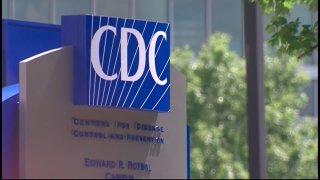
The Centers for Disease Control and Prevention is no longer recommending testing for everyone who’s been exposed to COVID-19, saying people who don’t have symptoms “do not necessarily need a test."
The agency quietly revised its testing guidance for asymptomatic individuals Monday, advising people who are vulnerable to the virus to get tested if they have been within 6 feet of an infected individual for at least 15 minutes.
The agency previously recommended testing for anyone with a “recent known or suspected exposure” to the virus even if they did not have symptoms. The CDC’s previous guidance cited “the potential for asymptomatic and pre-symptomatic transmission” as a reason why people without symptoms who were exposed to the virus be “quickly identified and tested.” Numerous studies have shown that people who don’t have symptoms can still carry and spread the virus — even in the presymptomatic stage a few days before symptoms appear or if they are asymptomatic and never develop symptoms.
“You do not necessarily need a test unless you are a vulnerable individual or your health care provider or State or local public health officials recommend you take one,” the CDC’s site now says of people without symptoms who were in close contact with an infected person for at least 15 minutes. “A negative test does not mean you will not develop an infection from the close contact or contract an infection at a later time.”
The agency, which directed CNBC to HHS for comment, also added new language referring to asymptomatic individuals as “healthy people,” language that’s frequently used in social media posts protesting the use of masks.
“In areas where there are limited number of new cases, State or local public health officials may request to test a small number of asymptomatic ‘healthy people,’ particularly from vulnerable populations,” the new guidance reads.
The CDC’s updated guidance still acknowledges that people can carry and spread the virus, even if they don’t have symptoms and feel healthy. In the CDC’s pandemic planning scenarios, the agency says its “current best estimate” is that up to 50% of spread of the virus occurs before patients begin to experience symptoms.
Coronavirus Pandemic
Full coverage of the COVID-19 outbreak and how it impacts you
Some epidemiologists criticized the change in guidance because of the role that asymptomatic people are suspected of playing in spreading the virus.
“This makes no sense. People without symptoms account for up to 50% of transmission,” tweeted Dr. Leana Wen, a public health professor at George Washington University and former health commissioner of Baltimore. “We need MORE testing, not less.”
Dr. Tom Frieden, the former director of the CDC under President Barack Obama, said on Twitter that the change is “probably indefensible” and was “likely imposed on CDC’s website.”
Will Humble, executive director of the Arizona Public Health Association and former director of the Arizona Department of Health Services, called the change “bizarre.”
“Testing contacts is a core part of contact tracing!” he said on Twitter. 50% of transmission happens before symptoms occur & you make this policy decision? The CDC brand is toast.”
The updated guidance also removed a line on the importance of testing and surveillance to the U.S. national response plan.
The guidance previously read: “Testing is a fundamental part of the United States SARS-CoV-2 Surveillance Plan, which uses multiple surveillance systems and epidemiology networks to monitor the progression and impact of SARS-CoV-2 spread in the United States.”
The guidance was updated “to reflect current evidence and best public health practices,” said Assistant Secretary for Health Adm. Brett Giroir, who leads the Trump administration’s testing effort.
“The updated Guidance places an emphasis on testing individuals with symptomatic illness, those with a significant exposure or for vulnerable populations, including residents and staff in nursing homes or long term care facilities, critical infrastructure workers, healthcare workers and first responders, and those individuals (who may be asymptomatic) when prioritized by public health officials,” he said in a statement.
This story first reported on CNBC.com. More from CNBC:


